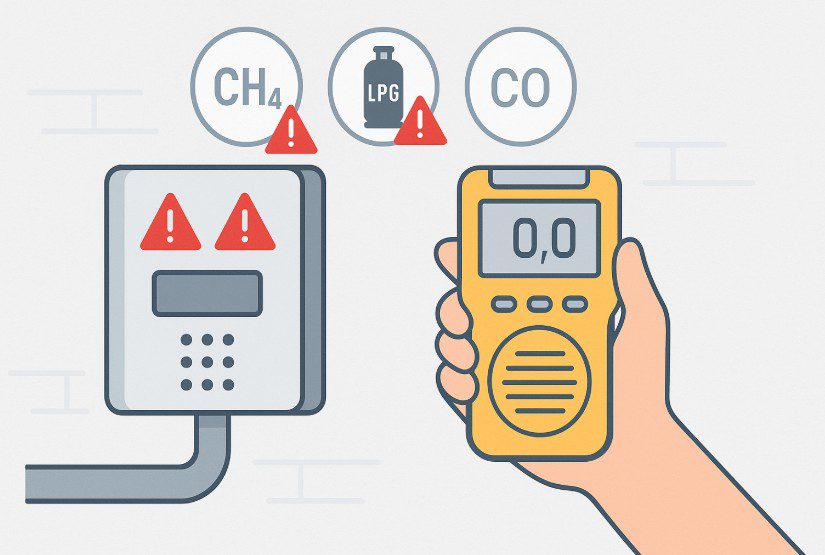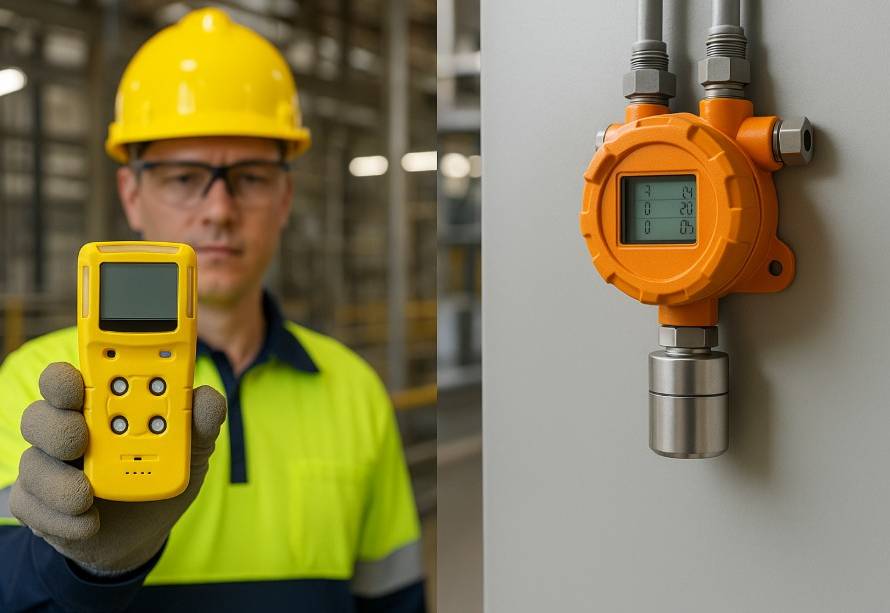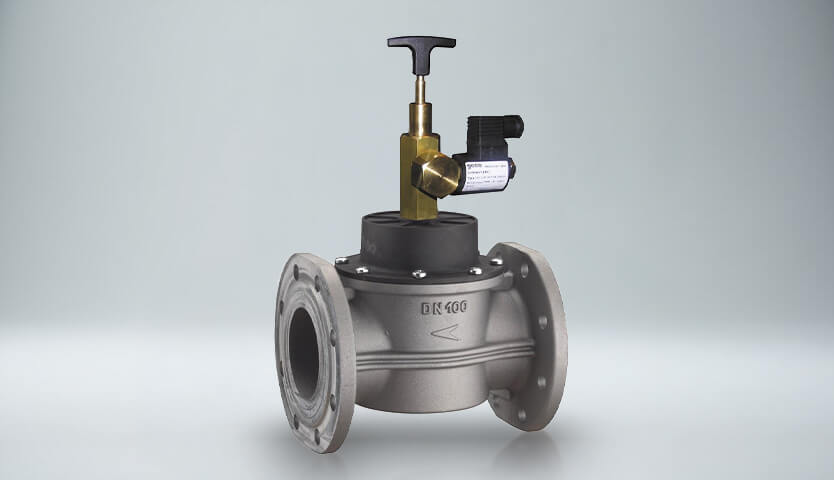Gas Detectors vs Gas Monitors: What’s the Difference

In industries where gases are present—such as oil & gas, manufacturing, chemical plants, and even households—safety is paramount. One of the most effective ways to protect people and property is by using devices that can detect hazardous gases before they reach dangerous levels.
Two terms often used interchangeably are gas detectors and gas monitors. While they both serve to detect gases, they are not exactly the same.
Understanding their differences can help you choose the right device, whether you’re looking for an industrial gas detector in Malaysia or a portable gas detector for fieldwork.
What Is a Gas Detector?
A gas detector is a device that senses the presence of hazardous gases in an area. It provides early warnings to prevent accidents such as gas leaks, explosions, or poisoning.
Key features:
- Detects specific gases like methane, propane, carbon monoxide (CO), hydrogen sulfide (H₂S), and oxygen deficiency.
- Available in fixed or portable models.
- Often integrated with audible alarms, visual indicators, or automatic shut-off systems.
👉 Browse our full range of Gas Detectors in Malaysia.
What Is a Gas Monitor?
A gas monitor is a broader term used for devices that continuously monitor the concentration of one or more gases over time. While detectors sense and trigger alarms, monitors often include data logging, trend analysis, and long-term exposure measurements.
Key features:
- Used for continuous monitoring of gas concentrations.
- Can be multi-gas or single-gas systems.
- Common in industrial plants, confined spaces, and occupational health settings.
Gas Detector vs Gas Monitor: The Core Difference
While both devices aim to improve safety, their functions are slightly different:
Feature | Gas Detector | Gas Monitor |
Purpose | Detects gas presence and triggers an alarm | Monitors gas concentration over time |
Usage | Immediate hazard detection | Long-term exposure analysis |
Installation | Fixed (wall-mounted) or portable | Fixed systems, handheld monitors, or wearable |
Data Recording | Basic (alarm only) | Advanced (data logging & reporting) |
Best for | Emergency alerts | Compliance, safety reporting, and long-term monitoring |
👉 See our Gas Detector FAQ & Safety Guide for detailed insights.
Types of Gas Detectors
Fixed Gas Detectors
- Installed in factories, kitchens, or storage rooms.
- Constantly scan the environment for leaks.
Example: SE192K Tecnocontrol Gas Detector.
Portable Gas Detectors
- Handheld or wearable devices.
- Ideal for field engineers, first responders, and maintenance teams.
Example: SE155 Tecnocontrol Portable Gas Detector.
Domestic Gas Detectors
- Designed for households.
- Detect common leaks from LPG stoves or heaters.
Example: Domestic Gas Detectors.
Types of Gas Monitors
Single-Gas Monitors
- Monitor one specific gas (e.g., carbon monoxide).
- Used in confined spaces or workplaces with a single gas risk.
Multi-Gas Monitors
- Detect multiple gases at once (O₂, CO, H₂S, CH₄).
- Common in oil & gas and mining industries.
Example: Hanwei GTQ-WD6200 Gas Detector/Monitor.
Area Gas Monitors
- Cover large spaces like warehouses or refineries.
- Provide real-time gas concentration data across zones.
Why Gas Detectors and Monitors Matter in Malaysia
Malaysia’s industries rely heavily on natural gas, LPG, and petrochemicals. Accidents from gas leaks can lead to:
- Explosions in factories and plants.
- Toxic exposure in confined spaces.
- Oxygen deficiency in underground works.
That’s why companies invest in certified gas detectors in Malaysia to comply with DOSH (Department of Occupational Safety and Health) guidelines and international safety standards (EN, ATEX, IECEx).
👉 Read our Gas Leak Detector Guide to understand how leak detection prevents accidents.
Gas Detector and Gas Monitor Applications
- Industrial Plants: Continuous monitoring of hydrocarbons, CO₂, and toxic gases.
- Oil & Gas: Portable devices for field inspection and refinery safety.
- Commercial Kitchens: LPG gas detectors for stoves and piping systems.
- Mining: Multi-gas monitors for confined space safety.
- Households: Small detectors for LPG or methane leaks.
👉 Explore our Gas Leak Detector Malaysia page for household and industrial solutions.
Advantages of Gas Detectors
- Quick response to leaks.
- Compact and easy to install.
- Cost-effective compared to full monitoring systems.
- Available in both domestic and industrial models.
Advantages of Gas Monitors
- Continuous monitoring and data logging.
- Ideal for compliance with workplace safety laws.
- Suitable for multi-gas environments.
- Provide trend analysis to detect recurring issues.
Choosing the Right Device: Gas Detector or Gas Monitor?
When deciding between the two, consider:
- Environment: Household, industrial plant, or outdoor site?
- Gas Type: LPG, methane, carbon monoxide, hydrogen sulfide?
- Purpose: Immediate alerts (detector) vs long-term safety tracking (monitor).
- Mobility Needs: Do workers move across sites? If yes, choose a portable gas detector.
Budget: Detectors are cheaper, while monitors offer more features.
Frequently Asked Questions (FAQ)
What is the difference between a gas detector and a gas monitor?
A gas detector senses the presence of gas and triggers an alarm, while a gas monitor continuously measures and records gas levels over time.
Do I need a portable gas detector?
If your work involves moving between different environments (oil rigs, confined spaces, field inspections), a portable gas detector is essential.
Are gas detectors mandatory in Malaysia?
Yes. Many industries are required by DOSH regulations to use certified detectors for workplace safety compliance.
Can a gas detector also act as a gas monitor?
Some advanced devices combine both functions, offering immediate detection and long-term monitoring with data logging.
How often should gas detectors and monitors be calibrated?
Calibration is typically required every 6–12 months, depending on manufacturer guidelines and industry standards.
Final Thoughts
While both gas detectors and gas monitors aim to keep environments safe, their functions differ:
- Gas detectors are ideal for quick hazard detection and alarms.
- Gas monitors provide continuous analysis, compliance reporting, and long-term safety assurance.
For industries in Malaysia—where LPG, natural gas, and petrochemicals are widely used—investing in the right device is not just about compliance, but also about protecting lives and assets.
At Comet Integrated, we supply a wide range of certified gas detectors and monitors tailored for domestic, commercial, and industrial needs. From portable gas detectors to multi-gas monitoring systems, our team can help you choose the right solution.
👉 Browse our full range of Gas Detectors in Malaysia or contact us today for expert advice.



